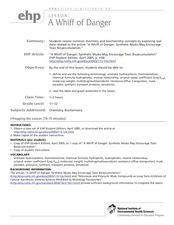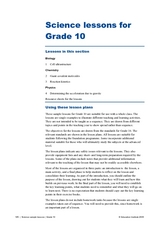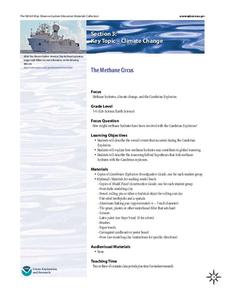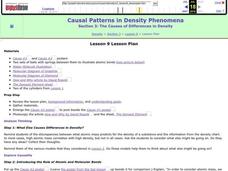Curated OER
Genome's Greatest Hits
Pupils explore the progression of discoveries that have led to the genetics knowledge that scientists currently have. In groups, students research scientists that have made important contributions to understanding the molecules behind...
Curated OER
COMPARISON OF FOUR-, SIX-, AND EIGHT-bp CUTS IN CALF THYMUS DNA
Students use this laboratory exercise, restriction enzymes to recognize a four-, six-, and eight-nucleotide sequence. Assuming that the four component nucleotides (A, C, T, G) are distributed randomly within a DNA molecule, then any...
Curated OER
Heat And Heat Transfer
Students role play molecules in a container as the container is heated to develop a definition of heat and temperature. They also observe demonstrations of conduction, convection, radiation, and phase transfer. Using these observations...
Curated OER
Simple Chemical Equations
Eighth graders interpret the chemical symbols and shorthand used for molecules and equations. Through guided practice, 8th graders work to decipher and interpret the symbols for chemical equations. An opportunity for independent...
Curated OER
Changes of State
Students examine molecules and the changes in energy of a system. In this energy systems lesson students complete a lab activity and describe changes of state.
Curated OER
Kinetic Theory
Young scholars describe how molecules of the different phases of matter move according to the Kinetic Theory. In this chemistry lesson, students observe and participate in teacher demos. They give real world applications of the kinetic...
Curated OER
Osmosis
Students explore diffusion and active transport. They observe the effects of eggs in vinegar and predict what will happen when eggs are placed in corn syrup with food coloring. Students complete worksheets which lead them to describe...
Coastal Carolina University
Osmosis and Diffusion Lab: Honey I Blew Up the Bear
Beginning biologists explore passive transport through two demonstrations and a hands-on inquiry. Spray air freshener from one spot in the classroom and have class members raise their hands as the scent reaches them. Also, place a teabag...
Curated OER
Phase Change
Learners compare the freezing temperature of two substances by conducting an experiment to freeze liquid ice cream. They vary the amount of salt used in the ice cubes during the freezing procedure to determine the change in the...
Curated OER
Highs And Lows
Students experiment to examine high and low pressure areas. They investigate why a high pressure area seeks a low pressure area.
Curated OER
Ideal Gas Law
In this chemistry worksheet, students write two forms of the ideal gas law. Then they identify the size and units of the ideal gas law. Students also solve the equations for each ideal gas law.
Curated OER
Alkene Reactions
In this chemistry worksheet, students write structural formulas for the products and illustrate stereo chemistry when necessary. Then they write the structures for the molecular formulas given for reactants and products for each problem.
Curated OER
Lattice Energy
A few basic facts about lattice energy are listed at the top of the page, including the formula used for calculations. Two charts follow: one for lattice energy and another for ion sizes. There is no work to do on this handout, but it...
Curated OER
A Whiff of Danger
Public health trainees read and write a summary of the article, "A Whiff of Danger". The article is not available through the link, but can be found on the National Center for Biotechnology Information website. After summarizing,...
Curated OER
Worksheet 2-2 Stoichiometric Tools
In this stoichiometry worksheet, students solve a variety of problems including finding empirical and molecular formulas, determining molarities of solutions, determining molecular weights of compounds and calculating the percent mass of...
Curated OER
Science Lessons for Grade 10
Tenth graders identify the parts and functions of the cell. In this series of science lessons, 10th graders investigate crystal formation in covalent compounds. They investigate the factors affecting reaction rates.
Virginia Department of Education
Atomic Structure: Elements
It's all relevant, really. Individuals use the scientific method to learn more about elements, atoms, and their placement on the periodic table. They conduct experiments using materials common in nature to explore how elements affect our...
NOAA
The Methane Circus
Step right up! An engaging research-centered lesson, the third in a series of six, has young archaeologists study the amazing animals of the Cambrian explosion. Working in groups, they profile a breathtaking and odd creature and learn...
Curated OER
How Can we Measure the Rate of a Chemical Reaction?
Pupils examine different types of chemical reactions. They explore how alcohol molecules affect the reaction rates. They answer discussion questions to end the lesson.
Curated OER
Transcription, Translation, and the Genetics of Microbes
Students construct various virus models using Fruit loops and Alphabits to represent nucleotides and molecules. They constructs capsomeres using shoes as the capsomeres and discuss various viruses.
Curated OER
The Causes of Differences in Density
Students explore what causes differences in density. They observe an models depecting atoms, compounds, and molecules. Students determine if there is air in between atomic bonds. They study the structure and spacing of molecular bonds.
Curated OER
USING YEAST AS AN ULTRAVIOLET LIGHT MEASUREMENT TOOL
Pupils realize the importance of organisms as standards of measurement and experimentation.The first lab is a simple survival curve that demonstrates the effects of UV light on cells. The second lab looks at repair mechanisms of the DNA...
Curated OER
Matter and Molecular Motion
Fourth graders define the states of matter and their properties. They demonstrate the air is matter and observe the effect of molecular motion through these activities.
Curated OER
Molecular Movement in Water Part 1- Diffusion
Students obseve and compare molecular movement within water at various temperatures and of varying salinity. They discuss the movement of water on a larger scale which can affect the movement and concentrations of microbial populations...
Other popular searches
- Atoms and Molecules
- Gumdrop Atoms and Molecules
- Atoms & Molecules
- Compounds and Molecules
- Water Molecules
- Organic Molecules
- Atoms Molecules
- Building Molecules
- Molecules of Life
- Gas Molecules
- Matter and Molecules
- Biological Molecules























